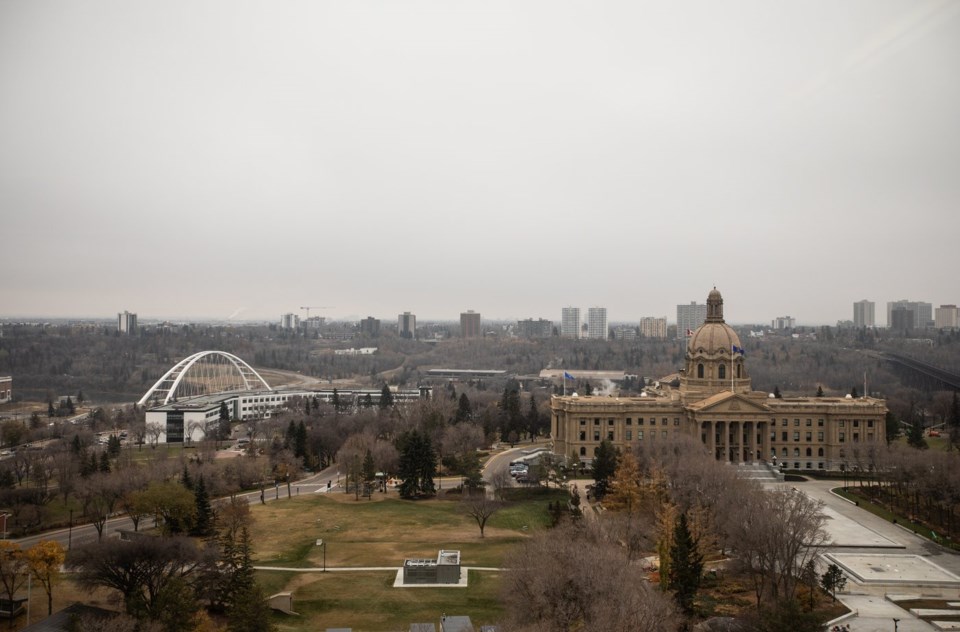EDMONTON ŌĆö AlbertaŌĆÖs information and privacy commissioner says she is worried -- but not surprised -- the province voted this week to pass legislation she says will reduce public access to government information.
"I am concerned," commissioner Diane McLeod said in an interview.
"All of those things I think are going to impact the right of access significantly for Albertans."
The government wrapped up the fall sitting of the legislature late Wednesday night, passing a bill from Service Alberta Minister Dale Nally on new rules surrounding freedom of information.
The bill creates new exemptions for what documents the public has a right to access.
They will not be allowed to see any document created by or for the premier, government ministers or the provincial Treasury Board, including correspondence like emails.
When the bill was introduced last month, McLeod wrote to Nally outlining multiple concerns, but no amendments were made to Nally's bill before it passed third and final reading.
"There was nothing in (the letter that) would have come as any surprise to them," said McLeod, whose office has been investigating the government's handling of freedom of information requests since the summer of 2023.
"I didn't really expect them to respond to my comments and recommendations.ŌĆØ
In her letter to Nally, McLeod wrote that the proposed changes give the government more power to avoid disclosing information to the public by including in the exempted correspondence ŌĆ£virtually all communication between political staff and (members of cabinet).ŌĆØ
Nally has repeatedly rejected the criticism, saying that such electronic communication should be confidential as freedom of information "is about access to government documents, not about political conversation."
Nally's bill also extends the time frame for when public bodies must respond to freedom of information applications to 30 business days from 30 days.
It also permits public bodies to dismiss information applications if they are deemed not to be "reasonable." What is and is not reasonable is not defined in the bill.
Nally has denied the changes will make Alberta's government less transparent.
ŌĆ£Every province is a little bit different, but at the end of the day there will be no light between us when it comes to offering access to information to Albertans,ŌĆØ Nally said Wednesday.
Irfan Sabir, the Opposition NDP's justice critic, said the bill will make accessing government records much more difficult.
"We are dealing with a government that is already very secretive, that is dishonest, that is not transparent, so it will make things way worse," said Sabir.
During the sitting, SmithŌĆÖs government also passed three contentious bills surrounding transgender youth.
The bills ban the prescribing of puberty blockers to those under 16, require parental notification and consent if those under 16 wish to use a different name or pronouns in school, and ban transgender athletes from competing in female amateur sports.
They also ban minors from receiving gender-affirming "top" surgery.
The NDP said they tried to remedy multiple bills with amendments but were voted down by SmithŌĆÖs UCP majority.
NDP Leader Naheed Nenshi said SmithŌĆÖs government lost sight of what matters to Albertans.
"They tabled ... (13) bills with not a single bill about affordability, about jobs, about housing, about public safety,ŌĆØ said Nenshi.
ŌĆ£The only things they had to say on health care and education were 'Let's make sure vulnerable kids are more vulnerable in schools and in the doctor's office,'" said Nenshi.
Not so, said government house leader Joseph Schow.
"We come to work every day and we do the people's business," Schow said Thursday.
"(Premier Smith) has spent the last two years traveling this province, listening, genuinely listening to Albertans and their concerns, and those concerns are reflected in legislation."
The assembly is expected sit again in February in time for the next provincial budget. Schow declined to provide details on upcoming legislation.
This report by The Canadian Press was first published Dec. 5, 2024.
Jack Farrell, The Canadian Press



